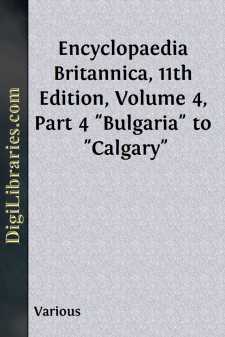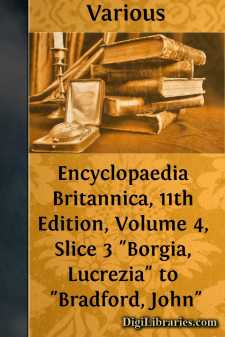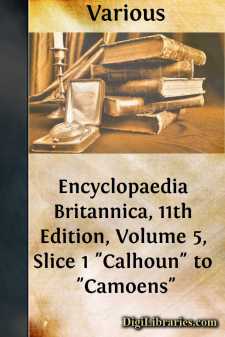Reference
- Atlases 1
- Bibliographies & Indexes 10
- Catalogs 55
- Dictionaries 1
- Encyclopedias
- Etiquette 14
- Handbooks & Manuals 19
- Heraldry 2
- Quotations 9
Encyclopedias Books
Sort by:
by:
Various
BENT, JAMES THEODORE (1852-1897), English traveller, was the son of James Bent of Baildon House, near Leeds, Yorkshire, where he was born on the 30th of March 1852. He was educated at Repton school and Wadham College, Oxford, where he graduated in 1875. In 1877 he married Mabel, daughter of R.W. Hall-Dare of Newtownbarry, Co. Wexford, and she became his companion in all his travels. He went abroad...
more...
by:
Various
BRESCIA (anc. Brixia), a city and episcopal see of Lombardy, Italy, the capital of the province of Brescia, finely situated at the foot of the Alps, 52 m. E. of Milan and 40 m. W. of Verona by rail. Pop. (1901) town, 42,495; commune, 72,731. The plan of the city is rectangular, and the streets intersect at right angles, a peculiarity handed down from Roman times, though the area enclosed by the...
more...
by:
Various
BULGARIA (continued from part 3) ... the mean interval being 60 m.; the summits are, as a rule, rounded, and the slopes gentle. The culminating points are in the centre of the range: Yumrukchál (7835 ft.), Maragudúk (7808 ft.), and KadimlÃa (7464 ft.). The Balkans are known to the people of the country as the Stara Planina or "Old Mountain," the adjective denoting their greater size as...
more...
by:
Various
BISHÂRÎN (the anc. Ichthyophagi), a nomad tribe of African “Arabs,” of Hamitic origin, dwelling in the eastern part of the Nubian desert. In the middle ages they were known as Beja (q.v.), and they are the most characteristic of the Nubian “Arabs.” With the Abâbda and Hadendoa they represent the Blemmyes of classical writers. Linguistically and geographically the Bishârîn form a connecting...
more...
by:
Various
BORGIA, LUCREZIA(1480-1519), duchess of Ferrara, daughter of Cardinal Rodrigo Borgia, afterwards Pope Alexander VI. (q.v.), by his mistress Vanozza dei Cattanei, was born at Rome in 1480. Her early years were spent at her mother’s house near her father’s splendid palace; but later she was given over to the care of Adriana de Mila, a relation of Cardinal Borgia and mother-in-law of Giulia Farnese,...
more...
by:
Various
BRADFORD, WILLIAM (1590-1657), American colonial governor and historian, was born in Austerfield, Yorkshire, England, probably in March 1590. He became somewhat estranged from his family, which was one of considerable importance in the locality, when in early youth he joined the Puritan sect known as Separatists, and united in membership with the congregation at Scrooby. He prepared in 1607, with other...
more...
by:
Various
CALHOUN, JOHN CALDWELL (1782-1850), American statesman and parliamentarian, was born, of Scottish-Irish descent, in Abbeville District, South Carolina, on the 18th of March 1782. His father, Patrick Calhoun, is said to have been born in Donegal, in North Ireland, but to have left Ireland when a mere child. The family seems to have emigrated first to Pennsylvania, whence they removed, after Braddock’s...
more...
by:
Various
CAMORRA, a secret society of Naples associated with robbery, blackmail and murder. The origin of the name is doubtful. Probably both the word and the association were introduced into Naples by Spaniards. There is a Spanish word camorra (a quarrel), and similar societies seem to have existed in Spain long before the appearance of the Camorra in Naples. It was in 1820 that the society first became...
more...
by:
Various
CARNEGIE, ANDREW (1837- ), American “captain of industry” and benefactor, was born in humble circumstances in Dunfermline, Scotland, on the 25th of November 1837. In 1848 his father, who had been a Chartist, emigrated to America, settling in Allegheny City, Pennsylvania. The raw Scots lad started work at an early age as a bobbin-boy in a cotton factory, and a few years later was engaged as a...
more...
by:
Various
CELTES, KONRAD (1459-1508), German humanist and Latin poet, the son of a vintner named Pickel (of which Celtes is the Greek translation), was born at Wipfeld near Schweinfurt. He early ran away from home to avoid being set to his father’s trade, and at Heidelberg was lucky enough to find a generous patron in Johann von Dalberg and a teacher in Agricola. After the death of the latter (1485) Celtes led...
more...











